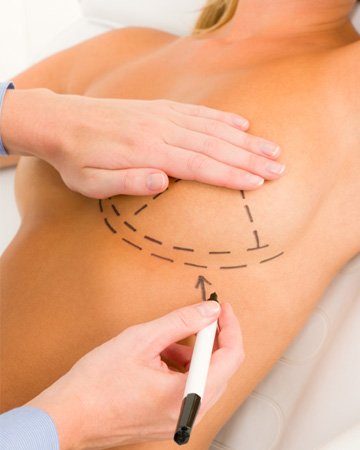
Breast implants & cancer
Breast Cancer Awareness Month may be over, but our commitment to monitoring our personal health and working together toward a cure should never pause. After all, one in eight women will develop invasive breast cancer over the course of her lifetime. In honor of women’s health, we're taking a closer look at the issue of implants and cancer.
Whether or not you have a familial history of breast cancer, it is an important factor to consider when deciding to undergo a breast augmentation. Do implants impede mammograms? What are the options for rebuilding the breasts after a mastectomy? I will cover the most frequently asked questions and uncover some surprising new research to help you stay happy and healthy before and after surgery.
Do implants increase a woman’s risk of breast cancer?
No — and newly developed implants may in fact be able to deter the growth of cancerous cells in breast reconstruction patients.
Earlier this year, researchers at Brown University created a new kind of implant that uses nanotechnology to deter cancer re-growth. The implant material, a polymer, has a microscopically bumpy surface, which reduces the growth of blood vessels that typically feed cancerous tumors and in turn attracts healthy endothelial cells.
This is a huge breakthrough for reconstructive surgery after cancer, as the implant may help banish any remaining cancer cells without the need for chemotherapy or other intensive and invasive treatments.
On the other hand, implants may delay initial detection of abnormal growth in the breast tissue, which can delay diagnosis. Cancer treatments are always most effective when intervention begins at an early stage.
If you have breast implants, the best way to ensure early detection is to undergo a mammogram before and after your breast augmentation surgery, and periodically thereafter. Women both with and without implants should receive annual physicals and perform monthly self-exams.
I want implants, but my family has a history of breast cancer. What can I do?
Although breast implants may decrease the accuracy of mammograms, they do not raise your risk of developing breast cancer, according to a study published in the Journal of the American Medical Association.
However, if you know that you are predisposed to breast cancer, the best thing you can do is undergo pre- and post-operative mammograms , see your doctor annually for check-ups and perform regular self-exams.
I had a mastectomy. What are my options for rebuilding my breast?
There are several options for rebuilding the breast after a mastectomy. There are a few different surgical methods that can be used for breast reconstruction, depending on the patient’s physiology and the desired results.
Autologous reconstruction — or reconstruction using the patient’s own tissue — is the preferred method. Muscle, fat and skin is removed from donor areas, like the abdomen or latissimus dorsi, and a flap is created over the breast area. This flap is then used to house and support a breast implant, which provides volume and shape to the reconstructed breast.
Alternatively, tissue expansion may sometimes be used in which an expander is placed under the skin and slowly filled over a period of four to six months, creating a pocket for an implant.
With either method, nipple and areola reconstruction is often performed simultaneously and can be achieved using tissue grafts, flap techniques and tattooing.
More breast health
How to perform a self breast exam
Can wearing a bra cause cancer?
Cookies and cupcakes for the cure